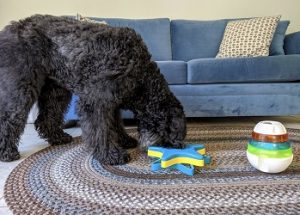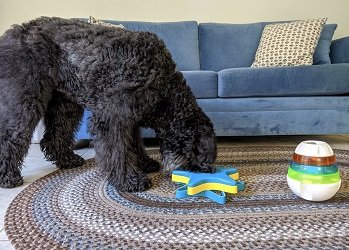Dogs love to wander around, put their mouth here and there. They nibble and bite and sometimes even swallow toys made out of plastic. After all, most of the things around us are made out of plastic. Aren’t they? What would I do, if my dog ate sharp plastic?
I guess all of us know plastic is non-biodegradable. Dogs cannot digest plastic and so they can be stuck in a very difficult situation. Don’t dogs have strong acid in their stomachs? Yes, that’s true but not strong enough to dissolve plastic. However, smaller pieces often pass easily but large pieces get stuck often needing surgery.
In such a situation the mind quickly thinks of making the dog vomit. DO NOT DO THAT RIGHT AWAY. Don’t make your dog vomit without the vet’s recommendation as this can cause further complications.
It’s not just plastic pieces that cause an obstruction in a dog’s body, it could be plastic wrap, plastic bags, and even toys. The shape and size hold particular importance. And let me tell you, sharp plastic is the most dangerous of all.

Why would a dog eat plastic?
Plastic is flavorless. Its color may be attractive but why would a dog eat plastic?
Adult dogs may eat sharp plastic because they are bored. Whereas, puppies mainly turn towards it because they are teething. But there could be many more reasons. Let’s talk in detail about them.
PICA
It may surprise you but dogs with nutritional deficiencies would be more inclined towards eating non-edible items like wood, rubber. PICA is seen in anemic patients or the ones with a worm infestation. It’s a physiological condition.
Moreover, dogs could be eating dirt and even plastic.
This isn’t the case with just dogs, many anemic humans eat dirt, ice cubes, and smell petrol.
Give your dog a balanced diet if he’s weak.
Teething Puppies
If you’re a mom to human kids as well as puppies you know teething is a crucial stage when little ones are growing up. During this time gums feel irritated, and the puppy would chew on anything that relaxes him. If the furry baby doesn’t find a teether, he might be chewing on plastic. And well, that’s dangerous!
Increased Hunger
A dog who is always looking for food may eat a plastic container instead of just waiting for a meal. He’s always hungry and even the sight of a container makes him eager.
Dogs show increased appetite when they’re stressed.
Anxiety
Some dogs have destructive behavior and due to that, they cause a lot of trouble. Sometimes barking and other times chewing on some sharp plastic.
These dogs need enough medical and physical exercises so they drain all their energy there.
Moreover, a few dogs practice separation anxiety. What is that? When owners leave for work or outing, dogs become sad and destructive clinging onto something that belongs to the owner. A bottle that is coated in the owner’s smell may attract the doggo. He’d chew on to it.
If your dog is showing behavioral problems professional help is quite necessary.
What happens if I find, my dog ate sharp plastic?
If the plastic piece is small and rounded it would pass through the GI tract and will easily be excreted in the stool. But if the dog eats sharp, long, or large plastic things can go in many different directions.
Plastic may get stuck and give a blockage. What does this mean? Food and water go through the same digestive tract as plastic, food, and water get stuck and are unable to pass. This is the most common complication that occurs when a dog consumes sharp plastic.
Not just blockage, sharp plastic can become lodged in the alimentary canal as it passes down and damages the gastric wall. This can cause inflammation and even perforation (tearing the GI wall).
Moreover, there also lies a danger that the mouth, teeth, or tongue can be cut if the dog eats sharp plastic. Let me tell you gums are most susceptible to bleeding.
Choking is another risk that often becomes unmanageable.
Upon intake of a sharp plastic item there is a chance that if you take medicines to vomit it, that may damage the esophageal lining or cause peritonitis. Thus, surgery may be needed to get it out successfully. If the sharp plastic eaten by your dog is removed early, the surgery does less damage but delaying it can damage further organs having a poor prognosis.
Your dog may be chewing onto some plastic bottle with med, or plastic coated in hazardous material. This may lead to poisoning including the obstruction caused by plastic.
Thus, plastic ingestion can lead to harmful effects in the body that require immediate medical attention.
How do you get to know if something is stuck after your dog ate sharp plastic?
If you weren’t an eyewitness when your dog was gulping on the plastic but still found chewed-up pieces this may put you in a doubtful situation. It’s now time to look for some signs and symptoms that may tell you if the plastic has caused any effects on the fluffy boy.
- Water and food may not be able to pass properly; this can cause constipation, diarrhea, and blood in the stool.
- The dog might throw up anything he eats. There is also a chance you’d notice small pieces of plastic in the feces.
- You may also see your dog eating less than usual and becoming lethargic without any physical activity.
- There may be signs of abdominal discomfort and the poor doggo would show restlessness. Prayer positioning or downward-facing dog is the most common position associated with severe abdominal pain. Additionally, the dog may cry, whin, or even whimper.
If a dog develops puncture or perforation this can lead to an infection, an infection shows as fever.
You may be surprised but larger breed dogs can pass down plastics easier than puppies. It is because of the size of the GI tract.
Can eating plastic kill a dog?
Yes, if the food passage has been blocked or the dog chokes it surely can. Even perforations can cause internal damage like peritonitis.
With dehydration and vomiting, the dog’s condition becomes more severe than ever.
However, there is good news if the plastic is removed before the development of symptoms this shows chances of getting back to health.
What to do if my dog ate sharp plastic?
What to do in an emergency situation where the dog is at risk. At first, you need to stop panicking and understand the gravity of the situation.
- Remove any plastic that’s in your dog’s mouth and dispose of whatever sharp plastic pieces lying around.
- Next, assess your dog’s condition. Is he distressed? Is he in pain? Is he choking?
- Call your veterinarian in no time. Even if the dog seems okay, it’s important to know the size and location of swallowed plastic.
- Take the dog to the emergency department.
If it’s large enough to cause an obstruction, the vet will run diagnostic procedures. Since X-rays can’t really detect all the plastic, ultrasound or endoscopy might be used to see the sharp plastic.
Here are a handful of tips to be followed until you don’t get time from a veterinarian.
- If the plastic has blend edges, give your dog bread with every meal, so that plastic passes down with this fiber bulk. Continue for 3-4 days. Notice his stool for signs of plastic or blood. Report to the doctor if you find blood. Additionally, if the blood is bright red it shows that the plastic is in the large intestine or near to the anal. Blackish, brownish blood can indicate its obstruction up above the GI tract.
- 1 teaspoon of hydrogen peroxide per 10 pounds of weight can help a dog throw up. Don’t do this without a doctor’s consultation.
- Pureed pumpkin and yogurt helps with constipation.
- If nothing helps, the last option is prompt surgery. As long as plastic stays inside the body it can cause infection and perforations. In short, to avoid serious complications surgery is necessary.
Precautions
To avoid your dog eating plastic in the near future, what must one do?
- Keep harmful items out of your dog’s reach.
- Empty trash cans regularly, you may also use ones that are covered with not-so-easy to open lids.
- Supervise your dog when he is playing with plastic toys.
- Keep your dog busy in healthy physical and mental exercises so he goes less towards other attractions.
- Have appropriate teething toys for puppies.
- Train your dogs not to eat plastic or chew on non-edible items.
- Get professional help for a dog with anxiety or behavioral issues.
Conclusion
With that said, I can safely conclude that if I’d find out my dog ate sharp plastic, I’d rush him to the ER. Taking him to the vet is important for avoiding late complications and also relieving his pain immediately.


The more you commit, the funnier it is — comedywriter.info